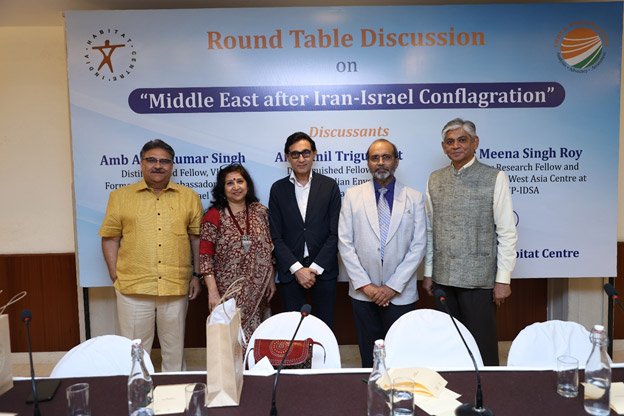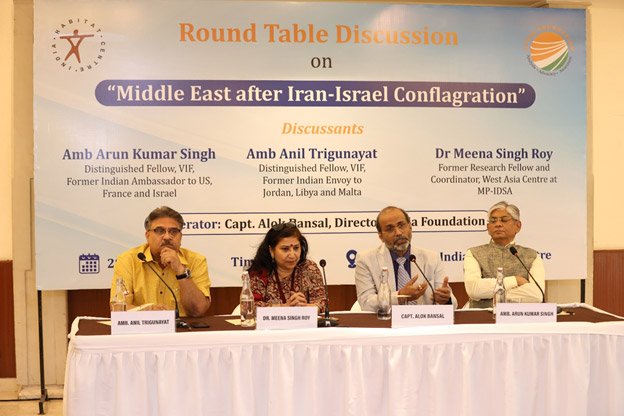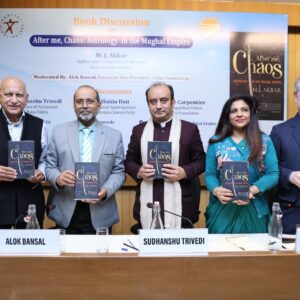India Foundation, in collaboration with India Habitat Centre, organised a Roundtable Discussion on ‘Middle East after Iran-Israel Conflagration‘ on Tuesday, May 28, 2024, at Juniper Hall, India Habitat Centre. The roundtable began with initial remarks by the moderator of the discussion, Captain Alok Bansal, Director, India Foundation. The session was followed by the remarks of the three panelists. After the remarks by each panelist, the programme concluded with a free-flowing Q&A session and a discussion.
The first panelist, Ambassador Arun Kumar Singh, Distinguished Fellow, VIF, and India’s former Ambassador to the US, France and Israel argued about the difficulties faced by Israel in achieving its stated goal of eliminating Hamas. He drew its parallel with the US’s efforts in Afghanistan to wipe out Al-Qaeda. He highlighted that notwithstanding the popular perception that the US is a declining power, it still remains a dominant power in the region of West Asia/Middle East and China and Russia, despite being very active in undermining the power of the US, still lag behind it. Amb Singh concluded by remarking that Israel, which followed the ‘doctrine of periphery’ in the initial decades of its establishment, has since 2000 started focusing on building its relationship with the Arab world, with the Abraham Accord as an example of it.
The second panelist, Dr. Meena Singh Roy, Former Research Fellow and Coordinator, West Asia Centre at MP-IDSA began her remarks that the region of Middle East and North Africa (MENA) has always surprised scholars in many things, like what happened in Tunisia and Egypt. She mentioned the need for deeper research as to why negotiations about peace in the region have always failed. Most of the monarchs in the region, according to Dr Roy, have bought peace and established a new social contract. She also highlighted that the issue of food and water security would be a bigger challenge for the region in the future. She concluded that although at the regional level, there are many conflicts in the Middle East, yet there is a movement for greater regional dialogue, like that between Iran and Saudi Arabia.
The third panelist, Ambassador Anil Trigunayat, Distinguished Fellow, VIF, and India’s former envoy to Jordan, Libya and Malta, spoke about the attack on Israel by Hamas on 7th October. He emphasised that it was both about the loss of its people as well as about the loss of the perception of its infallibility. He pointed out that it must not be forgotten that the basic cause of the problem in the Middle East is the absence of any solution to the Palestinian issue. He also argued that there are no protests in the Arab world like those happening in US universities because the Arab leaders do not want a repeat of the Arab Spring and this attack has recharged Arab streets like never before. Amb Trigunayat concluded by stating that Middle Eastern states have indulged themselves in smart diplomacy and have started focusing on the countries of the East like China, India and Korea. The discussion concluded with the final remarks of the moderator Captain Alok Bansal, who gave an interesting insight about how the Arab streets remain anti-US, while their governments remain pro-US, which is diametrically opposite to the case of Iran, where although the regime remains staunchly anti-US, the people remain otherwise.






